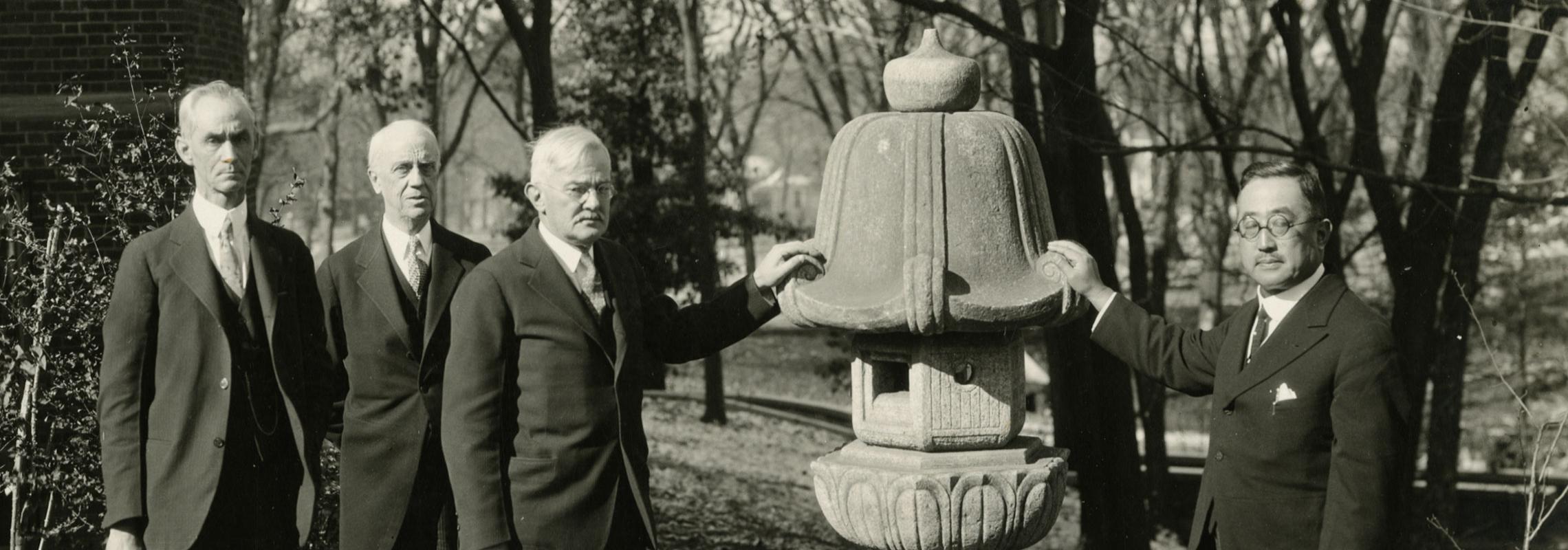Many citizens from Missouri have been adept at diplomacy and served locally as governors or politicians and internationally in foreign affairs positions as generals, soldiers, or correspondents.
Since the admission to the union, Missouri has never failed to do more than its part in every war in which the country has engaged. When the President called for volunteers in 1837 to fight the Seminoles, this state sent a regiment under Colonel Gentry, of Boone County. After a long steamboat trip down the Mississippi and across the Gulf to Florida, it rendered valiant service against the Indians in the Everglades. In the Mexican War its sturdy volunteers under Colonel Doniphan, of Ray county, made the long march across the plains, the longest in history, and contributed in the largest measure to the success of our arms. In the Civil War its entire fighting strength was under arms on one side or the other. In the Spanish-American War the Missouri National Guard volunteered to a man, filling Missouri's quota under the President's call for two hundred thousand volunteers. When in the Mexican crisis of 1916 the President called out the National Guard of the United States, the Missouri National Guard was the first to reach the Rio Grande and for six months it patrolled 145 miles of the Mexican border, its 5,030 officers and men making a record for efficiency, which brought a special acknowledgment from the Secretary of War.
Following the Corps of Discovery, President Jefferson gave William Clark, of Lewis and Clark, a dual appointment as brigadier general of the territory’s militia and principal U.S. Indian agent west of the Mississippi River. Clark spent much of his time tending to Indian affairs and countering British influence in the region. During his time as Indian agent, Clark negotiated numerous treaties between Native Americans and the federal government. He persuaded the Osage to sign a treaty that ceded tribal land in Missouri and Arkansas to the government, making way for an eventual new wave of settlers. In 1813 William Clark was appointed governor of Missouri Territory by President James Madison and served for seven years. His success as an administrator, talent for diplomacy, and concern for his constituents led one historian to call him “Missouri’s best territorial governor.”
Articles from Missouri Historical Review and Missouri Times
- Berger, Henry W. “John Francis Cahill's Pursuit of Empire in Post-Civil War St. Louis.”
Missouri Historical Review 110 (April 2016): 181-195. - Clark, Harvey "Missourians in Service"
Missouri Historical Review 14 (October 1919): 1-15. - Graham, Margaret Baker "Baptism by Fire: A Missourian in the Great War."
Missouri Historical Review 95 (July 2001): 394-412. - Grant, Philip A. Jr. "The Presidential Election of 1940 in Missouri."
Missouri Historical Review 83 (October 1988): 1-16. - Hart, James A. "James Redpath, Missouri Correspondent."
Missouri Historical Review 57 (October 1962): 70-78. - Isern, Thomas D. "Exploration and Diplomacy: George Champlin Sibley's Report to William Clark, 1811."
Missouri Historical Review 73 (October 1978): 85-102. - Johnson, Peter K. "Satisfying "Brutal Appetites": Intertribal Raids, Indian Slaves, and the Erosion of Spanish-Indian Diplomacy in Upper Louisiana."
Missouri Historical Review 108 (October 2013): 27-49. - Kelley, John L. "An Insurgent in the Truman Cabinet: Henry A. Wallace's Effort to Redirect Foreign Policy."
Missouri Historical Review 77 (October 1982): 64-93. - Kenney, Anne R. "She Got to Berlin: Virginia Irwin, St. Louis Post-Dispatch War Correspondent."
Missouri Historical Review 79 (July 1985): 456-479. - Lemons, J. Stanley "The Cuban Crisis of 1895-1898: Newspapers and Nativism."
Missouri Historical Review 60 (October 1965): 63-74. - Margulies, Herbert F. "Selden P. Spencer, Senate Moderates and the League of Nations."
Missouri Historical Review 83 (July 1989): 373-394. - Misse, Fred B. "Truman, Berlin and the 1948 Election."
Missouri Historical Review 76 (January 1982): 164-173. - Neilson, James Warren "Congressional Opinion in Missouri Concerning the Spanish-American War."
Missouri Historical Review 51 (April 1957): 245-256. - Rhodes, Benjamin D. "Missouri to Murmansk: Chasing the Bolsheviks with Major Edward E. MacMorland, March-July 1919."
Missouri Historical Review 88 (January 1994): 123-144. - Sale, Sara L. "Admiral Sidney W. Souers And President Truman."
Missouri Historical Review 86 (October 1991): 55-71. - Soapes, Thomas F. "The Fragility of The Roosevelt Coalition: The Case of Missouri."
Missouri Historical Review 72 (October 1977): 38-58. - Wilburn, Mark Steven "Keeping the Powder Dry: Senator Harry S. Truman and Democratic Interventionism, 1935-1941."
Missouri Historical Review 84 (April 1990): 311-337. - Winkler, John A. "Making a Missouri Historical Center of International Fame."
Missouri Historical Review 54 (January 1960): 148-157.
Catalog
Many of the State Historical Society’s holdings are included in the SHSMO online catalog. The State Historical Society holds numerous books on the history of diplomacy and foreign affairs. Use the terms "diplomacy", "diplomat" and "foreign affairs". For a more specific search, simply add the subject term “Missouri” to your search.
Historic Missourian Biographies
Manuscripts
The State Historical Society of Missouri's manuscript collections contain papers of diplomats and Foreign Service personnel as well as accounts of eyewitness observers of political events in other countries. Notable collections include the family papers of Russell Vincent Dye, a US diplomat in Europe and Mexico during and following World War I, and the papers of Raymond P. Brandt, a Washington correspondent for the St. Louis Post-Dispatch from 1923 to 1967 who made several reporting trips to the Soviet Union.
View All Diplomacy and Foreign Affairs Manuscript Collections

